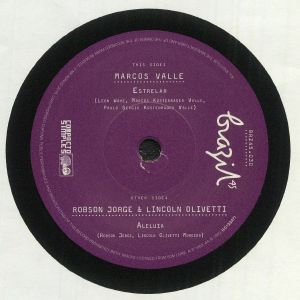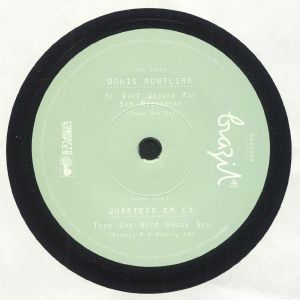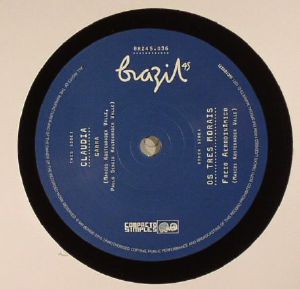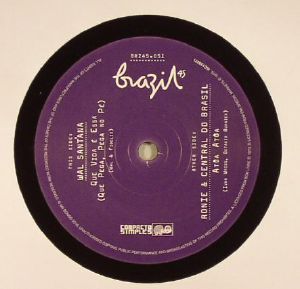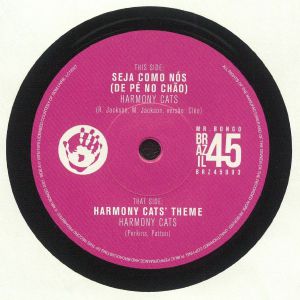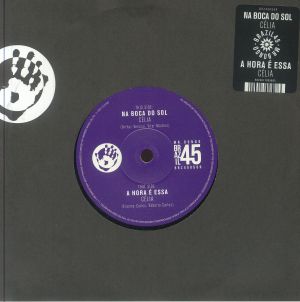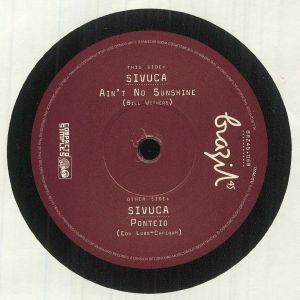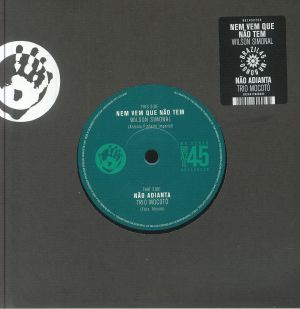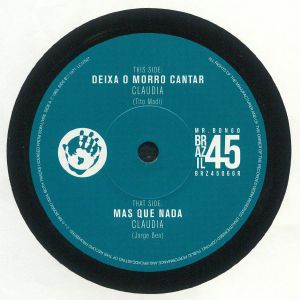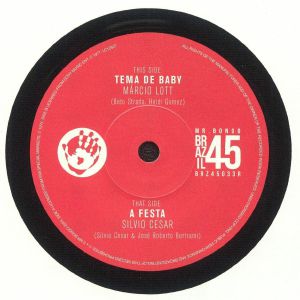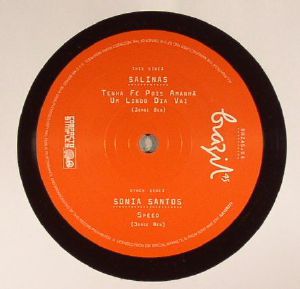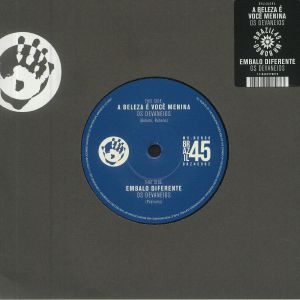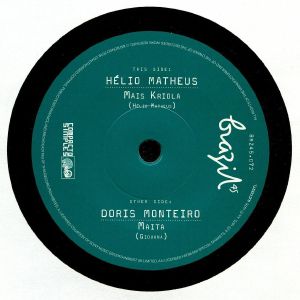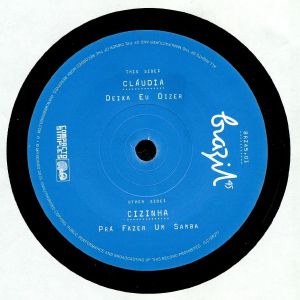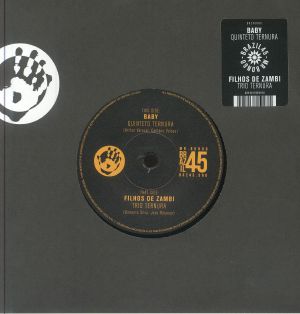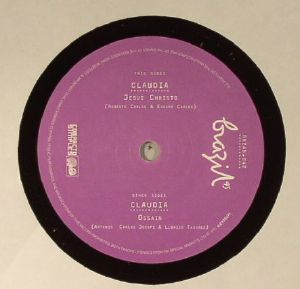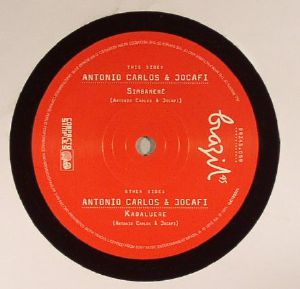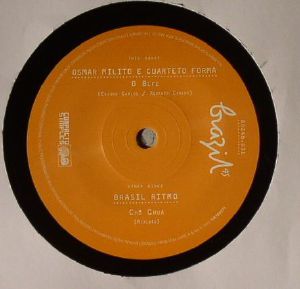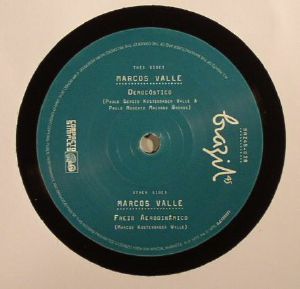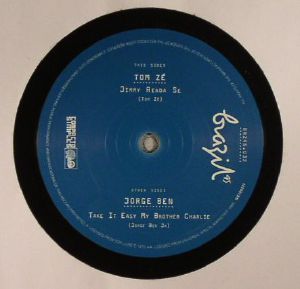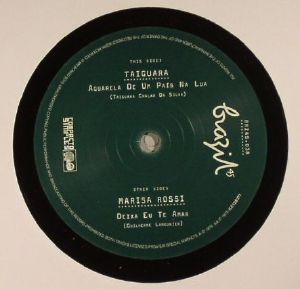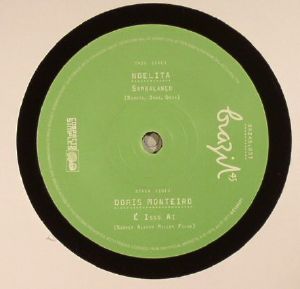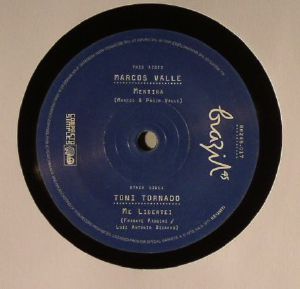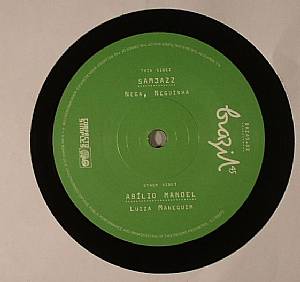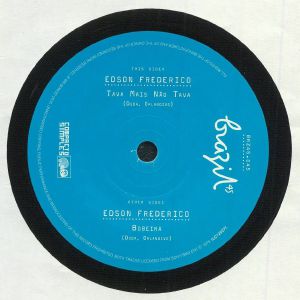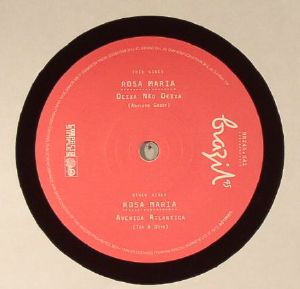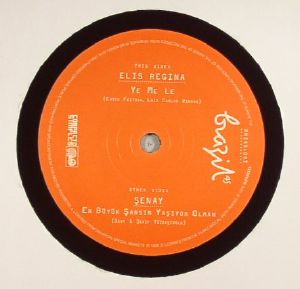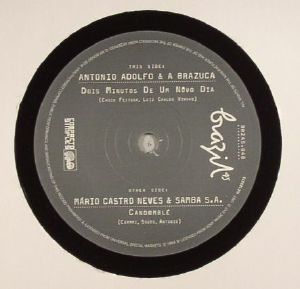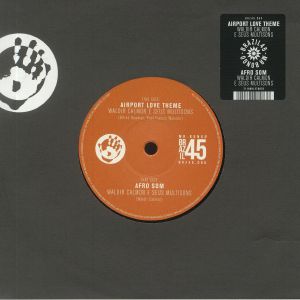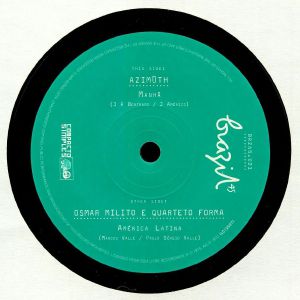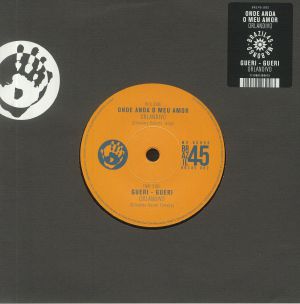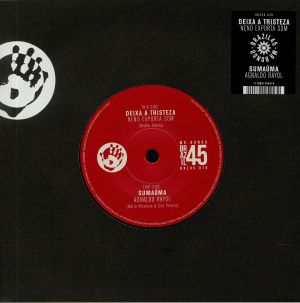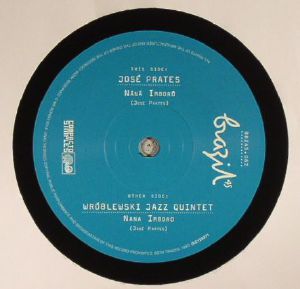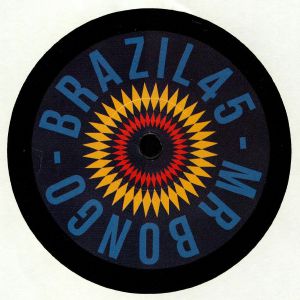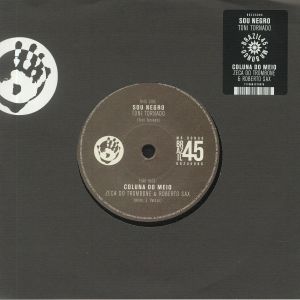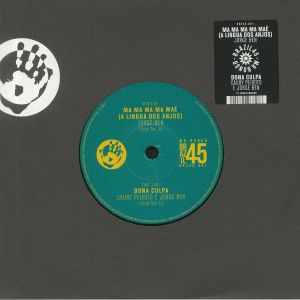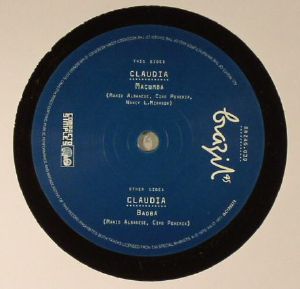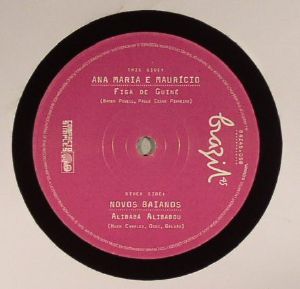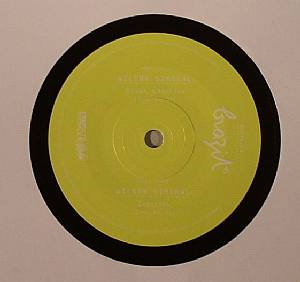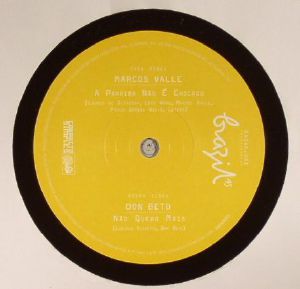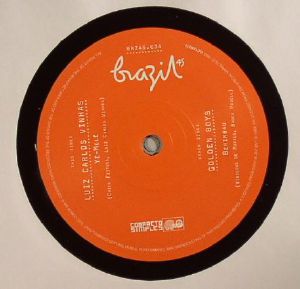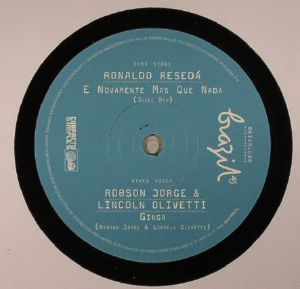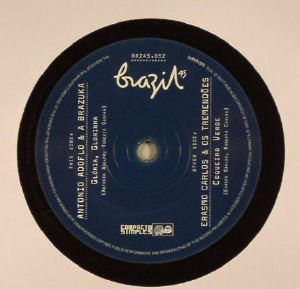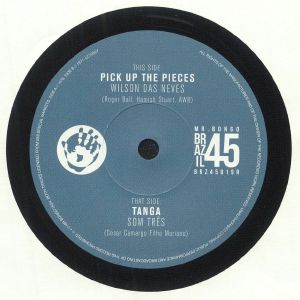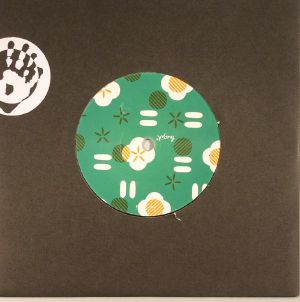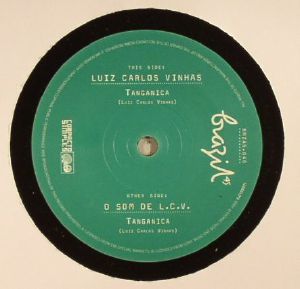Filter
Type
Music
Format
Featured
Release Title
Price
Tags
International charts
Bestselling International vinylEstrelar (limited 7")
Cat: BRZ 45030. Rel: 29 May 24
Review: Two silky sides of Brazilian disco soul on Mr Bongo's perennial Brazil 45s series. First up, long-haired lothario samba fusionista Marcos teams up with Leon Ware for a pristine polished piece of early 80s disco funk. Golden harmonies, staccato vocals and a super juicy bassline; it's not hard to see why it was his best selling single. Flip for the equally smooth "Alleluia" from Brazilian boogie gospelist; this one is all about the percussion heavy breakdown. Proper sunshine block party business.
… Read moreIntérprete: Mukatsuku Records Chart, JimmyTheTwin, RUSTAM OSPANOFF., Craig Charles Funk And Soul, Pete Haigh, Boy Oliver, * Record Breakin' Music *, Javi Frias, Hubbz, Voodoocuts, Bosq, Juno Recommends Funk, Galletas Calientes, Eddie C, Afro Beat Foundation, I Love Disco!, Mr Bongo Recordings, JKriv (Razor-N-Tape), Osmose, I Love 45's!, Jean Claude Gavri, Admin, CHEZZ, Chesney, Juno Recommends International, Cultures Of Soul US
… Read more in stock $11.88
Se Voce Quiser Mas Sem Bronquear (limited 7")
Cat: BRZ45 09. Rel: 08 Jan 25
Review: Mr Bongo's Brazilian 45 series hits it's ninth gear with two region-defining slices of sun-kissed samba soul. Doris takes the lead with delicate frontage. Leading from the front, all instruments follow her cues and mirror each vocal flourish with mild big band cheekiness. The instantly distinctive "Tudo Que Voce Podia Ser" from sister quartet Quarteto Em Cy is a great twist on a Latin classic with its slightly rocky guitars and full bodied harmonies. Previously released in 1972, a return has been long overdue.
… Read more in stock $11.88
Cat: BRZ 45012R. Rel: 21 Jan 25
Review: The 12th release on Mr. Bongo's signature 45s series saw a reissue of two foundational releases in Brazil's modern popular music category; now the record hears a second round, fresh again off the master metal lacquer. On the A, we hear Brazilian samba luminary Elza Soares covering Jorge Ben's classic 'Mas Que Nada' - albeit with a hoarser vocal tone, such was Soares' signature voice, one which only led to a whopping 34-album career. B-sider Elizabeth, by contrast, upholds a mystery; the artist was nicknamed "Gatinha do Mato" ("jungle cat"), and recorded 'Vou Falar-Lhe Francamente' at some indeterminate point in 1960s Sao Paolo, when and where Brazilian local styles blended with funk and rock.
… Read moreIntérprete: Pete Haigh
in stock $11.88
Review: Jane, Roberto, and Sidey Morais - Brazil's Os Tres Morais - are placed alongside the wonderful Claudia for the latest all Brazilian showdown courtesy of the always point-side Brazil45 series from the Mr. Bongo label. The latter gives us the mythical "Garra", a tune that sits very nicely next to the likes of Marcos Valle and co, and the singing trio get a reissue of 2006's "Freio Aerodinamico", a gorgeous blend of samba, disco, and something perfectly exotic and vintage. Heart-warmers.
… Read moreIntérprete: Mukatsuku Records Chart, Mr Bongo Recordings
! low stock $11.88
Black Soul Brothers (7")
Cat: BRZ45 05. Rel: 25 Apr 14
in stock $11.88
Que Vida E Essa (7")
Cat: BRZ45 051. Rel: 01 Jan 90
in stock $11.88
Review: The Brazil45 series has always been pure gold and now come a pair f beauties from Harmony Cats, a vocal quintet-turned-trio from Sao Paulo known for their disco-era hits. Harmony Cats' 'Theme' from 1976 is their most recognised track outside Brazil and is inspired by Rhythm Heritage's Barretta's Theme with its spacey breakbeats, lush vocals and percussive flair, all of which have made it a true crossover classic. On the B-side, 'Seja Como Nos (De Pe No Chao)' delivers an exuberant Brazilian twist on The Jacksons' 'Shake Your Body (Down to the Ground)'- it's a guaranteed floor-filler with radiant disco energy and Harmony Cats' signature vocal style.
… Read moreIntérprete: Juno Recommends International
in stock $10.00
Review: The wonderful Brazil 45 series from Mr Bongo is back with its big old torch to shine a beam of deserving attention on two standout funk and bossa nova tracks from Rosa Maria, which originally came in 1972 and have remained in demand ever since. The A-side, 'Deixa Nao Deixa', blends Afro-Latin guitar, wild horns and percussion with infectious vocal harmonies that all coalesce into a Brazilian funk classic. On the B-side, 'Avenida Atlantica' delivers alternating funk and bossa beats beneath layers of vocals, horns and percussion to bring big energy and dancefloor-ready heat. This reissue ensures these timeless tracks become available for your rotation once more.
… Read moreIntérprete: ISOUL8 (Volcov)
in stock $11.35
Review: Amongst fans of Brazilian music, Sivuca is arguably best known for his 1973 cover of "Ain't No Sunshine" - later a favourite on the rare groove scene - which re-casts the Bill Withers classic as a sumptuous chunk of shuffling samba sunshine. Here, the track gets reissued as part of Mr Bongo's brilliant Brazil 45s series, alongside his lesser-known - but no less impressive - cover of Edu Lobo's "Ponteio".
… Read more in stock $11.88
Nem Vem Que Nao Tem (remastered) (reissue) (limited 7")
Cat: BRZ 45020R. Rel: 29 Aug 24
Review: A dynamic duo of Brazilian classics on 7" from Wilson Simonal and Trio Mocoto. On Side-1. you have the infectious samba-MPB hit 'Nem Vem Que Nao Tem' by Wilson Simonal, a standout from his 1967 Alegria, Alegria !!! album. This track gained renewed fame in 2002 when it was featured in the critically acclaimed film City of God, exciting new audiences with its lively rhythms. On the flip side, Trio Mocoto delivers the orchestral-infused gem 'Nao Adianta,' first appearing on their self-titled 1977 Arlequim LP. Known for their collaboration with Jorge Ben on seminal albums like 'Forca Bruta,' this group was instrumental in developing the samba rock sound, blending samba, soul, and rock with an unmistakable sun-kissed flavor. This release is a vibrant celebration of Brazil's rich musical heritage, capturing the essence of two legendary acts in one compelling package.
… Read moreIntérprete: Voodoocuts, Juno Recommends International
in stock $11.88
Review: Two supreme MPB/bossa nova cuts courtesy of Mr Bongo's resident popular-musica plug Claudia. The MPB singer began her career at the tender age of nine and gained recognition in the 1960s. Her repertoire extends to samba and rock, and having put out an extensive suite of LPs, we're more than faithful in Claudia's selective brilliance, not least when it comes to her own catalogue. Here on the A we have 'Deixa o Morro Cantar', which features on Claudia's very first 7", released in 1965 by RGE: a warm, burring, brass-backed beat typhoon. And on the flip side comes her timeless version of the mythic 'Mas Que Nada', a jazzier folk-funk take on the Jorge Ben classic.
… Read more in stock $10.27
Intérprete: Craig Charles Funk And Soul, ISOUL8 (Volcov)
in stock $11.88
Cat: BRZ 4504. Rel: 27 Mar 14
in stock $10.81
Review: For the latest edition in the label's superb Brazil 45s series, the Mr Bongo crew has decided to reissue one of their all-time favourite tracks, Os Devaneios' 'Embala Differente'. Situated here on side B, the track is one of the funkiest and heaviest samba floor-fillers going - a 1978 workout that adds punchy horns, disco-boogie bass, strong male lead vocals and mazy organ solos to an infectious and percussively dense rhythm track. A-side 'A Beleza E Voce Menina', a slightly later recording, is equally as impressive, with the obscure Brazilian band adding elements of soul, South American boogie and AOR to their funky-as-hell samba template. Another essential instalment in one of the most on-point reissue series around.
… Read more in stock $11.88
Intérprete: Voodoocuts
in stock $11.88
in stock $11.88
Baby (remastered) (7")
Cat: BRZ 45060R. Rel: 27 Sep 24
Review: The remastered 7" reissue from Brazil 45s/Mr Bongo features two highly coveted tracks from Quinteto Ternura and their predecessor, Trio Ternura. This pressing revives two rare gems from the past with a fresh, high-quality cut. On Side-1, Quinteto Ternura delivers 'Baby,' a dazzling Brazilian modern soul track penned by Caetano Veloso and arranged by Arthur Verocai. Originally from their 1974 self-titled LP, this song is a smooth blend of tropical bliss and has long been a cherished rarity. Flipping to the Side-2, Trio Ternura's 'Filhos De Zambi' offers an upbeat samba-funk delight. Released in the same year, this track is filled with vibrant energy from the original trio, featuring a catchy chorus and a dynamic key change. Co-written by the siblings' father Umberto Silva and Jose Ribamar, it remains a dancefloor favorite. This reissue provides a valuable opportunity to own these classic tracks in their prime.
… Read moreIntérprete: Juno Recommends Funk
in stock $10.00
in stock $11.88
! low stock $11.88
Review: Mr Bongo take an MPB breather, tempering their recent larger-scale ambition to reissue mammoth Brazilian disco on comp with a 7" side order appetiser of a classic Brazilian MPB track. Celia's 'Na Boco Do Sol' ('At the Mouth of the Sun') is a gestalt slice of slow-samba, bringing with it a dash of torrid soul and telenovela cinematics. The favourite Arthur Verocai collaborator sings of psychic cities and imaginariums of the soul, verifying a well-travelled spirit; Verocai himself, and Vitor Martins, both lend the song a fuzzy phonic with their guitars and strings. And on the B side comes 'A Hora e Essa, the first track from her second self-titled LP: a lively samba-funk workout, doused in jazzy piano licks, strutting guitars and punchy horns.
… Read more in stock $11.35
O Bofe (limited 7")
Cat: BRZ 45031. Rel: 16 Nov 15
in stock $11.88
in stock $11.88
Review: Mr Bongo's Brazil 45s series gets its rock on with two hairy grooves, both of which have enjoyed the sampler's crafty knives over the years. First up, Tom Ze's "Jimmy Renda-se" rolls with an oily sleazy groove that's peppered by a playful lyrical rhythm that transcends language barriers. Ben's "Take It Easy My Brother Charlie" joins the dots between Samba and very light Rock with all the signatures that made Mr Ben the legend he remains to this day with big vocal harmonies and infectious textures of Brazilian percussion.
… Read moreIntérprete: Mukatsuku Records Chart, Smoove, Hubbz, Afro Beat Foundation, JKriv (Razor-N-Tape), I Love 45's!
in stock $11.88
Aquarela De Um Pais Na Lua (limited 7")
Cat: BRZ 45038. Rel: 25 Jan 16
Review: Mr Bongo's Brazil 45s series continues its consistently rich vein of form with two more beautifully contrasting - and previously difficult to track down - Brazilian soul jazz fusions from the 70s. Side A is inhabited by one of the era's most interesting individuals. Infamously censored and eventually exiled, Taiguara's chaotic flute, guitar and piano arrangement is a tight weave of melodies, counter melodies and start dynamics. Flip for the classically soul-oriented "Deixa Eu Te Amar" will bright horns, brash drums and a bold vocal from Marisa Rossi. Pow.
… Read moreIntérprete: Afro Beat Foundation, The Expansions
in stock $11.88
in stock $11.88
Review: Two premium Latin funk documents on one limited 45, Mr Bongo deliver once again: Marcos Valle needs no introduction to Brazilian music enthusiasts. "Mentira" is a self-cover as Valle takes his 69 classic "Mentira Carioca" and develops the dynamic with a vocal style that's highly reminiscent of Donovan. Flip for Toni Tornado's Black Rio anthem "Me Libertei". Fusing sleazy rock n roll with jazzy Latin soul, madly this is the first time it's ever graced a 45!
… Read more in stock $11.88
in stock $11.88
in stock $11.88
Review: Two powerful bossa nova workouts from 1972: Brazilian chanteuse Rose Maria delivered two incredible funk jams on Tapecar which escaped her prolific album releases and never enjoyed a repress. Until now... The Afro-Latin soul of "Deixa Nao Deixa" is all about the sudden dynamic from purring verses to emphatic, harmonic chorus while "Avenida Atlantica" takes a more straight-up funk route with its dominant horns and heavy boss break. Instant party material.
… Read more in stock $11.35
Review: The Brazil 45 series from Mr Bongo bursts through the picture with yet another rocking 7" fire starter by two vintage pop greats - we have to say, their format simply works. First up is Elis Regina, a Brazilian singer who released a countless pop records back in the '60s, and "Ye Me Le" is a soft, seductive Brazilian soul warmer complete with blasting trumpets and that inimitable South American percussion swagger. Turkey's Senay features on the flip with "En Buyuk Sansin Yasiyor Olman", an incandescent lover's ballad that makes a welcome change to the more widely heard Turkish psych sound of the '70s.
… Read more in stock $11.88
Dois Minutos De Um Novo Dia (limited 7")
Cat: BRZ45 048. Rel: 01 Jul 16
Intérprete: Afro Beat Foundation, I Love 45's!
in stock $11.88
Airport Love Theme (7")
Cat: BRZ 45085. Rel: 26 Mar 21
Review: Mr Bongo's reliable Brazil 45s series reaches its' 85th instalment. This time round the Brighton-based label has chosen to offer up two cuts from Waldir Calmon's 1970 set Waldir Calmon E Seus Multisons. While the album is not all that renowned, the track 'Airport Love Theme' - which resides on the A-side here - most certainly is, thanks to Madlib sampling it on the Madvillain album. It's a laidback and languid fusion of mellow soul breaks, Mexican stand-off trumpets, soaring choral vocals, Mediterranean acoustic guitars and mazy organ solos, all topped off with the sugary polish often associated with classic lounge music. Over on side B there's a chance to savour another killer cut from the same set, Jean-Jacques Perrey-esque lounge funk groover 'Afro Son'.
… Read more in stock $11.88
Manha (limited 7")
Cat: BRZ45 021. Rel: 20 Apr 15
Review: A tale of two sides, Azimuth's classic "Manha" should be recognisable to many; taken from their self-titled LP in 1975, its golden harmonies and lavish, lolloping Bob James style jazz are as timeless as they were 40 years ago. Flip for "America Latina". Conjured by prolific collaborator Osmar Milito (whose discography features the likes of Sammy Davis Jr, Spanky Wilson and Liza Minelli), its striking, sing-along charms are no accident... It was actually created for 70s Brazilian soap opera Selva De Pedra.
… Read more in stock $11.88
Review: Following persistent requests, Mr Bongo has finally relented and dedicated an edition of their popular Brazil 45s series to Orlandivo Honorio de Souza, a composer, singer and percussionist whose 1977 album Oelandivo remains high on my collectors' wants-lists. Wisely, their A-side pick is 'Onde Anda O Meu Amore', a cosmic and spacey fusion of samba-soul and jazz-funk rich in ethereal flute lines and intergalactic keys. This time round it comes backed by the equally as impressive 'Gueri Gueri', an insatiable samba-rock number wrapped in heady accordion, jangly acoustic guitar and punchy horn sounds.
… Read moreIntérprete: Voodoocuts, Afro Beat Foundation
in stock $11.88
Deixa A Tristeza (7")
Cat: BRZ45 076. Rel: 07 Feb 20
Review: After delivering some killer reissues over the last few years, Mr Bongo's brilliant Brazil 45s series has reached "buy on sight" status. It goes without saying that the label's latest double-header of hard-to-find Brazilian gems is white hot. A-side Neno Exporta Som's impossible-to-find 1971 gem "Deixa A Tristeza", a wild and life-affirming fusion of samba and funk full of fuzzy sax solos, glassy-eyed vocals and heavyweight grooves. Over on the flip you'll find another killer cut from '71: "Sumauma" by MPB star Agnaldo Rayol. Blessed with a great groove and incredible arrangement, it sounds like a Brazilian take on the sort of over-the-top songs used to open James Bond movies in the 1970s (albeit with a bit of samba sunshine thrown in).
… Read more in stock $10.81
Nana Imboro (7")
Cat: BRZ45 062. Rel: 07 Feb 17
Review: The 62nd single in Mr Bongo's long-running Brazil 45s series is notable for containing Jose Prates' "Nana Imboro", a deep, hypnotic and intoxicating samba cut that was initially recorded and released way back in 1958. Relatively slow and steady by samba standards, its chanted refrain is thought to be the inspiration for Jorge Ben's much better known "Mas Que Nada". Wisely, Mr Bongo has backed Prates' sublime original with a 1960 cover by obscure Polish outfit Wroblewski Jazz Quintet. This dispenses with the chanting, instead increasing the number of intertwined horn parts. Given that original copies of the rare Polish EP it first appeared on will set you back serious money, it's great to see this fine cover included here.
… Read more in stock $11.88
Review: For the latest volume in their essential "Brazil 45" series of seven-inch singles, Brighton-based Mr Bongo has decided to offer up a fresh pressing of MPB star Renata Lu's superb 1971 single "Faz Tanto Tempo". You'll find the title track, a heavyweight fusion of US style soul and funk with added Latin percussion and a touch of easy listening sassiness, on side A, with original B-side "Sambaloo" on the flip. This features Lu singing over a hybrid samba/boogaloo backing track rich in jaunty bass, rasping horns and jazzy electric piano riffs. It's arguably every bit as alluring as the A-side.
… Read moreIntérprete: Mukatsuku Records Chart, Ju & juju
in stock $10.81
Sou Negro (7")
Cat: BRZ45 086. Rel: 16 Apr 21
Review: Mr Bongo offers up an incredible 86th volume in the Brazil45 series, and this time it's Black Rio funk from two mainstays of the sound, Toni Tornado & Zeca Do Trombone. A-side 'Sou Negro' is from Tornado's 1970 EP on Odeon Records. It's a sought after number that despite lasting only just over two minutes still makes an indelible impression. Zeca Do Trombone & Roberto Sax join forces on the flip for 'Coluna Do Meio,' which is a more smooth, easy going jazz laced tune compared with the raw and direct a-side. This one has an acrobatic vocal and sunny riffs bringing pool-side vibes under clear blue skies.
… Read more in stock $10.00
Cat: BRZ 45081. Rel: 16 Oct 20
Review: Mr Bongo's excellent Brazil.45 series digs deeper into the legacy of Jorge Ben, one of Brazil's most famous musical exports and an enduring samba king. Opening up is 'Ma Ma Ma Ma Mae (A Lingua Dos Anjos)' which was originally on his 1980 album Alo Alo, Como Vai? It's a modern sound, with disco inflections and big wind sections, but also some trademark Ben playfulness in the lyrics which speak of flying saucers and angels. O the flip, things slow down and get more steamy and sensuous on 'Dona Culpa' from his Cauby! Cauby!' album of the same year. Two sides, two styles, one irrepressible artist.
… Read more in stock $11.88
in stock $10.81
Figa De Guine (7")
Cat: BRZ 45058. Rel: 15 Dec 16
Intérprete: Mukatsuku Records Chart
in stock $11.88
Review: Mr Bongo's Brazil 45s series continues with aplomb... On their eighth outing we find the hugely prolific 60s/70s troubadour Wilson Simonal paying homage to the legendary Jorge Ben with two exemplary cover versions. Whether it's on the soft big band emphasis and teasing fills on "Zazueira" or the upbeat, feel-good swinger "Silva Lenheira" there's a raw clarity to Wilson's vocals that instantly endure; the way he pushes his voice to the very edge of breaking on the high notes and a rich, clear delivery, he's the consummate soulful showman.
… Read more in stock $11.88
Cat: BRZ45 061. Rel: 07 Feb 17
Review: For the latest volume in their ongoing Brazil 45s series, Mr Bongo has decided to change tack. The two tracks showcased here are from the golden age of Brazilian boogie. On the A-side you'll find Marcos Valle's "A Paraiba Nao E Chicago", a largely overlooked cut from his 1981 full-length Vontade De Rever Voce. While not as instantly as infectious as some of his better-known singles, it's still superb; a breezy, blue-eyed soul cut full of rising horns and sweet Portuguese vocals. On the B-side, you'll find Don Beto's 1978 disco-funk jam "Nao Quero Mais", a superb track that was seemingly inspired by the Doobie Brothers' "Long Train Running".
… Read more in stock $11.88
Review: The moment you put that needle down on "Ye Mele" you will know that you've lit a serious firecracker; that bold piano hook and silver harmonies have that instant classic appeal even if you've never heard it. A bona fide Brazilian classic. It's backed by a 68 track from the Golden Boys. A much more introspective fusion of late 60s American folk, Latin and Ennio-style original score music, full attention is arrested right until the stunning crescendo finale.
… Read more in stock $10.81
Cat: BRZ45 065. Rel: 14 Aug 17
Review: The 65th volume in Mr Bongo's admirable Brazil 45s series shines a light on Rio De Janeiro's turn-of-the-'80s boogie scene. On the A-side you'll find "E Novamente Mas Que Nada" by Ronaldo Resado, a five-minute chunk of samba-laced boogie sunshine that was originally featured on the artist's eponymous 1979 debut album. While wonderful, it's slightly overshadowed by flipside cut "Ginga", one of the highlights from Robson Jorge and Lincoln Olivetti's sought-after 1982 full-length (which, incidentally, was recently reissued by Mr Bongo and is well worth checking). Joining the dots between synth-heavy electrofunk, horn-toting disco-funk and languid jazz-funk, the instrumental track is arguably one of the best Brazilian boogie records ever made. Don't sleep.
… Read more in stock $11.88
in stock $11.88
Taieiras (reissue) (7")
Cat: BRZ 45018R. Rel: 21 Jan 25
Review: The Brazil 45 series is pure gold for lovers of Latin sounds across the funk, jazz and soul spectrum. Each one sells out fats but usually emcees back around, as is the case with this 18th edition. It features Ely Camargo's 'Taieiras' from his Ely's 1972 album Cantos Da Minha Gente and is a lively folk-inspired track sampled famously by DJ Yoda in 2012. Despite recording 12 albums, Ely remains an enigmatic figure whose music is all we have to feed off. On the flip side, Rio sibling trio Trio Esperanca shine with their psychedelic gem from their 1971 self-titled album. Known for their stunning harmonies, the group released seven albums between 1963 and 1975 but this is one of their finest moments.
… Read more in stock $11.88
Cat: BRZ45 019R. Rel: 20 Dec 24
Review: Mr Bongo restock a brilliant 7" in their signature Brazil 45s series. The nineteenth to grace it, this blue-starred slice of small wax shone a light on Wilson das Neves' brilliant cover of Average White Band's 'Pick Up The Pieces' on the A, as well as a Mr Bongo fave on the B, Som Tres' potent samba-funk overflow 'Tanga'. The former flexes the historic muscles of a mythic Brazilian percussionist and vibesman, lending fidgety soft feels to AWB's already lull-lifting concoction; then 'Tanga' contrasts to this sense of measuredness with pure animal verve, as Tres' calls out to his bandmates commandingly amid whirlwinds of piano and drums.
… Read more in stock $10.00
in stock $11.88
in stock $11.88

 USD
USD






